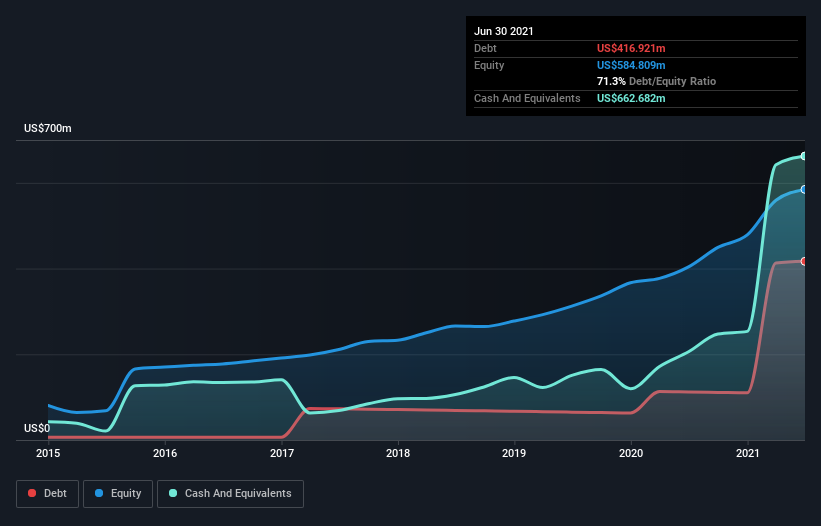Alarm.com Holdings (NASDAQ:ALRM) Has A Rock Solid Balance Sheet
Legendary fund manager Li Lu (who Charlie Munger backed) once said, 'The biggest investment risk is not the volatility of prices, but whether you will suffer a permanent loss of capital.' It's only natural to consider a company's balance sheet when you examine how risky it is, since debt is often involved when a business collapses. As with many other companies Alarm.com Holdings, Inc. (NASDAQ:ALRM) makes use of debt. But should shareholders be worried about its use of debt?
When Is Debt Dangerous?
Generally speaking, debt only becomes a real problem when a company can't easily pay it off, either by raising capital or with its own cash flow. If things get really bad, the lenders can take control of the business. However, a more usual (but still expensive) situation is where a company must dilute shareholders at a cheap share price simply to get debt under control. Of course, the upside of debt is that it often represents cheap capital, especially when it replaces dilution in a company with the ability to reinvest at high rates of return. The first step when considering a company's debt levels is to consider its cash and debt together.
Check out our latest analysis for Alarm.com Holdings
What Is Alarm.com Holdings's Net Debt?
You can click the graphic below for the historical numbers, but it shows that as of June 2021 Alarm.com Holdings had US$416.9m of debt, an increase on US$112.0m, over one year. But it also has US$662.7m in cash to offset that, meaning it has US$245.8m net cash.
How Strong Is Alarm.com Holdings' Balance Sheet?
We can see from the most recent balance sheet that Alarm.com Holdings had liabilities of US$104.1m falling due within a year, and liabilities of US$467.9m due beyond that. Offsetting this, it had US$662.7m in cash and US$92.6m in receivables that were due within 12 months. So it actually has US$183.3m more liquid assets than total liabilities.
This surplus suggests that Alarm.com Holdings has a conservative balance sheet, and could probably eliminate its debt without much difficulty. Simply put, the fact that Alarm.com Holdings has more cash than debt is arguably a good indication that it can manage its debt safely.
Also good is that Alarm.com Holdings grew its EBIT at 14% over the last year, further increasing its ability to manage debt. When analysing debt levels, the balance sheet is the obvious place to start. But ultimately the future profitability of the business will decide if Alarm.com Holdings can strengthen its balance sheet over time. So if you're focused on the future you can check out this free report showing analyst profit forecasts.
Finally, a business needs free cash flow to pay off debt; accounting profits just don't cut it. Alarm.com Holdings may have net cash on the balance sheet, but it is still interesting to look at how well the business converts its earnings before interest and tax (EBIT) to free cash flow, because that will influence both its need for, and its capacity to manage debt. During the last three years, Alarm.com Holdings generated free cash flow amounting to a very robust 92% of its EBIT, more than we'd expect. That puts it in a very strong position to pay down debt.
Summing up
While it is always sensible to investigate a company's debt, in this case Alarm.com Holdings has US$245.8m in net cash and a decent-looking balance sheet. The cherry on top was that in converted 92% of that EBIT to free cash flow, bringing in US$83m. So is Alarm.com Holdings's debt a risk? It doesn't seem so to us. There's no doubt that we learn most about debt from the balance sheet. But ultimately, every company can contain risks that exist outside of the balance sheet. Be aware that Alarm.com Holdings is showing 2 warning signs in our investment analysis , and 1 of those is concerning...
If you're interested in investing in businesses that can grow profits without the burden of debt, then check out this free list of growing businesses that have net cash on the balance sheet.
This article by Simply Wall St is general in nature. We provide commentary based on historical data and analyst forecasts only using an unbiased methodology and our articles are not intended to be financial advice. It does not constitute a recommendation to buy or sell any stock, and does not take account of your objectives, or your financial situation. We aim to bring you long-term focused analysis driven by fundamental data. Note that our analysis may not factor in the latest price-sensitive company announcements or qualitative material. Simply Wall St has no position in any stocks mentioned.
Have feedback on this article? Concerned about the content? Get in touch with us directly. Alternatively, email editorial-team (at) simplywallst.com.

 Yahoo Movies
Yahoo Movies 
